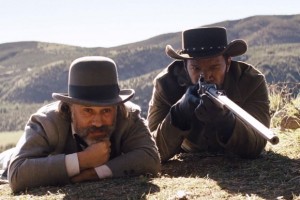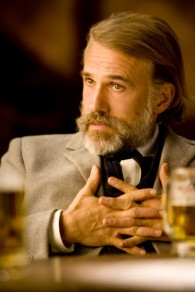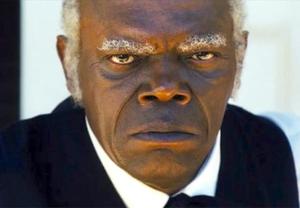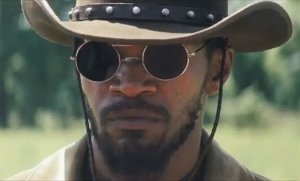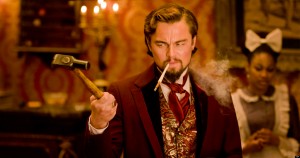Django Unchained was a BAMF of a movie. It was one of the most entertaining of the Best Picture films, but who doesn’t love a good Tarantino?
The combination of humor and badassery that QT brings to his films keeps you watching and wanting more and makes the extreme violence seem like background noise so the bigger issues shine through.
The acting was near perfect. Jamie Foxx, Christoph Waltz, Samuel L. Jackson, and Leonardo DiCaprio seriously brought it. I think I formed a crush on Waltz through this movie and am probably going to be looking to see all of his previous films. Because he, as the kind-hearted killer Dr. Schultz, was SO incredibly engaging. The character was brilliantly written, so I’m sure that is part of my bias. A German doctor-turned-bounty-hunter who kills for a living but draws his moral line at slavery? I’ll take two.
Django and Stephen, played by Jackson, were both, as far as I am concerned, unlikable characters. While they’re supposed to be on the good-guy, bad-guy spectrum, it seemed to me that they both had a little of each in them, and that they both leaned more towards the “bad”. Django, our protagonist, may have had good intentions (rescuing his wife), but in the process we see his total lack of regard for other humans That’s fine, no one is perfect, but it harkens the same question I asked in my Lincoln post: Do the ends justify the means? Do they have to? (On a side note, when I mention the disregard for human life I’m referring to the other slaves and the man farming with his son, NOT the asshole slave-owners and cronies.)
The film, inevitably and in true Tarantino fashion, turned into a bloodbath. But the fantastical shoot-em-up gore-spectacular towards the end was a cake walk when compared with a scene from earlier in the movie. The two most disturbing scenes for me offered less blood and less gore, 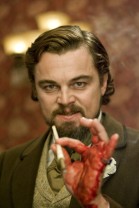 but made up for it in the unnerving vision of pure unfiltered evil played out on screen.
but made up for it in the unnerving vision of pure unfiltered evil played out on screen.
The first time Django and Dr. Schultz meet Calvin Candie (DiCaprio), the men are gathered in a smoking room, complete with bar and bartender, pool table, and snacks—a man-cave of sorts. The source of entertainment? Deathmatch-by-fireplace of two slaves. These two enormous black men were forced, by their owners, to fight one another to the death. Candie’s fighter wins, ending the match with a hammer.
I admit I’m a girl and I’m not big on violence. But there was something more sinister than two men fighting and one man dying. The fact that it was forced upon them, that they had to disavow any morals they may have had to quench their most basic human instinct of survival, made me absolutely sick with remorse.
When the prized fighter mentioned above is caught in his attempt to run away, he cries that he can’t do it, can’t fight anymore. The war waged on his morals, on his soul, through the mandingo fights was too much to bear. He is questioned, ridiculed, and subsequently ripped apart by dogs in front of a caravan of people including a line of slaves, Candie and his employees, Dr. Schultz, and Django, who doesn’t flinch.
This was the worst moment in the film for me. It was difficult to watch and stuck with me long after the film had ended.
Here’s what Django does: It gives us an exciting and entertaining excuse to take a look into our Country’s most shameful history. We all know it happened, we all learn in school that slavery was bad and that the days of freedom came. But putting into context the brutality of small day-to-day events, and the fact that the entire black American experience was formed out of this treacherous circumstance, creates an opportunity for one to think critically and in depth about slavery and the need for repentance that never came.
I hear the criticisms, but I’m a big fan of this film.
